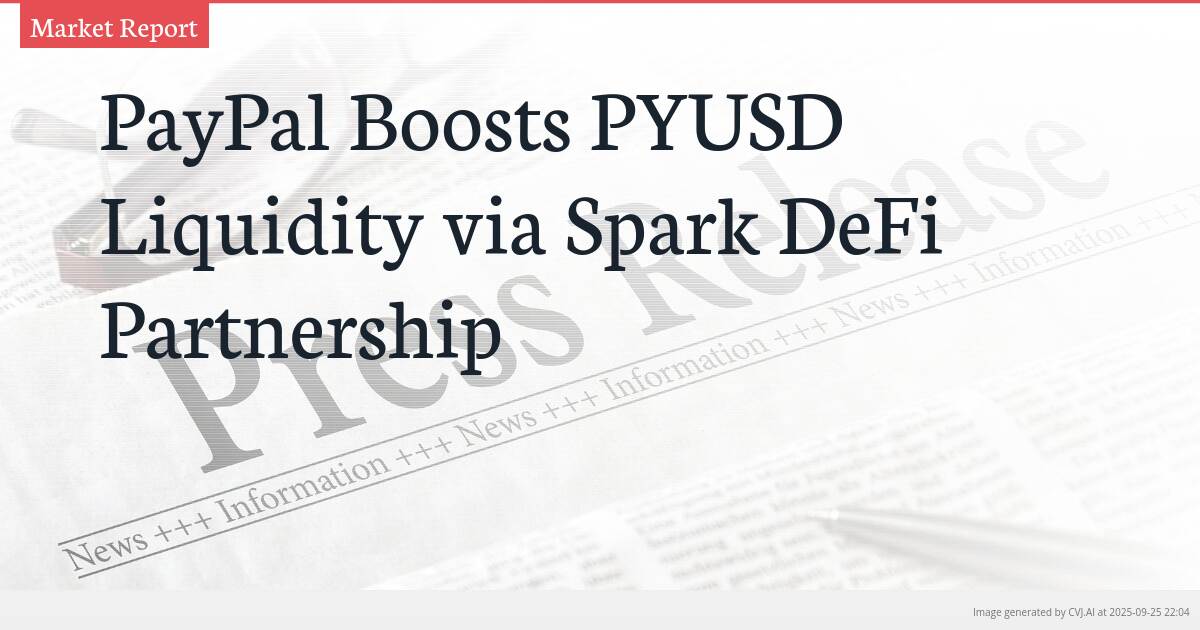This summary text is fully AI-generated and may therefore contain errors or be incomplete.
Introduction
In a significant move bridging traditional finance with decentralized protocols, PayPal has partnered with Spark to dramatically enhance liquidity for its PayPal USD (PYUSD) stablecoin. Since its August listing on Spark’s lending platform SparkLend, PYUSD deposits have surged past $135 million, signaling both institutional confidence and a strategic push into the DeFi ecosystem by the payments giant. This collaboration leverages Spark’s $8 billion-plus liquidity layer, marking one of the most substantial integrations between a major TradFi player and decentralized finance infrastructure to date.
Key Points
- PYUSD deposits on SparkLend surpassed $135 million since August listing
- SparkLend operates under Sky, the successor to MakerDAO, with $8B+ stablecoin reserves
- Partnership marks major TradFi-DeFi collaboration for stablecoin liquidity expansion
Strategic Partnership Drives Rapid Liquidity Growth
The partnership between PayPal and Spark represents a calculated effort to position PYUSD as a major player in the stablecoin market. By integrating with SparkLend, Spark’s specialized lending market for stablecoins, PayPal gains immediate access to deep liquidity pools and a established user base within the DeFi space. The rapid accumulation of over $135 million in PYUSD deposits in a relatively short timeframe since the August listing demonstrates strong initial market reception. This liquidity injection is crucial for PYUSD’s utility, as it enables smoother trading, borrowing, and lending activities, thereby increasing its attractiveness to both institutional and retail participants.
For PayPal, this move is more than just a liquidity play; it’s a strategic entry point into the burgeoning DeFi ecosystem. By aligning with a protocol like Spark, which has roots in the influential MakerDAO ecosystem, PayPal gains credibility and technical infrastructure that would be time-consuming and complex to build independently. The partnership allows PayPal to leverage Spark’s expertise in decentralized finance while focusing on its core strengths in payment processing and user acquisition. This symbiotic relationship highlights how traditional finance companies are increasingly seeking partnerships rather than outright competition with established DeFi protocols.
Spark's Robust Infrastructure Backs PYUSD Integration
Spark brings substantial technical and financial infrastructure to this partnership, particularly through its Spark Liquidity Layer which is backed by more than $8 billion in stablecoin reserves. This massive reserve base provides crucial stability and security for PYUSD’s integration, mitigating risks associated with liquidity crunches or market volatility. SparkLend, launched in 2023 from the MakerDAO ecosystem and now operating under Maker’s successor entity Sky, has established itself as a trusted platform for stablecoin-focused lending, making it an ideal partner for PayPal’s foray into DeFi.
The technical architecture of SparkLend offers PYUSD holders sophisticated financial primitives typically unavailable in traditional finance. Users can now employ PYUSD as collateral for loans, participate in yield-generating activities, and engage in complex financial strategies within a decentralized framework. This functionality significantly enhances PYUSD’s utility beyond simple payments or value transfer, positioning it as a versatile financial instrument. The integration with Spark’s ecosystem also means PYUSD benefits from the protocol’s existing security audits, smart contract infrastructure, and community governance mechanisms.
Broader Implications for TradFi-DeFi Convergence
This partnership signals a notable shift in how traditional financial institutions are approaching decentralized finance. Rather than building competing systems, companies like PayPal are increasingly opting to integrate with existing DeFi infrastructure. This approach accelerates time-to-market while leveraging the security and community trust that established protocols like Spark have cultivated. The collaboration demonstrates that TradFi institutions recognize the efficiency and innovation potential of DeFi, particularly in areas like liquidity provision and programmable money.
The success of PYUSD on SparkLend could pave the way for similar integrations between other traditional finance players and DeFi protocols. As more institutions observe PayPal’s positive results, we may see increased adoption of stablecoins and DeFi infrastructure across the financial sector. This convergence has the potential to bring substantial institutional capital into DeFi while simultaneously introducing decentralized finance principles to mainstream users. However, it also raises questions about regulatory compliance and the preservation of decentralization principles as traditional entities become more deeply embedded in the ecosystem.
Looking forward, the partnership’s evolution will be closely watched for indicators of how deeply PayPal intends to embed itself within DeFi. Future developments might include additional product integrations, cross-chain expansions, or even governance participation within the Spark ecosystem. The $135 million milestone represents just the beginning of what could become a transformative relationship between traditional finance and decentralized protocols, potentially accelerating the maturation and mainstream adoption of both stablecoins and DeFi infrastructure.
📎 Read the original article on cointelegraph.com

